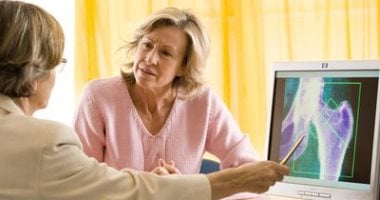Osteoporosis causes bones to weaken and easily break, making them so fragile that any fall or even a simple effort such as bending or Cough It can cause fractures, and fractures associated with osteoporosis most commonly occur in the hip, wrist and spine.
According to what was mentioned by the site mayoclinic The symptoms of osteoporosis are:
Usually there are no symptoms in the early stages of bone loss, but once the bones are weakened as a result of osteoporosis, you may have symptoms and signs, namely:
1: Back pain as a result of fracturing or eroding the bony vertebrae.
2: Short stature over time.
3: Posture bend.
4: Easier than expected bone fractures.

One of the causes of osteoporosis
Because your bones are in a state of constant renewal – new bone is made and old bone is fractured. When you were young, your body was making new bone faster than it would break down old bone, and in this way the bone mass increased. After the early 20s this process slows down, and most people reach peak bone mass by the time they reach their thirties. And with age, bone mass is eroded faster than it is built.
Your likelihood of developing osteoporosis depends in part on how much bone mass you gain during your youth. Genetic factors control peak bone mass to some extent and also differ according to each ethnic group, the greater the maximum bone mass at the age of 30, the greater your bone balance “in the bone health bank”, and your likelihood of developing osteoporosis decreases as you age.

Risk factors
There are a number of factors that increase your likelihood of developing osteoporosis – including age, race, healthy lifestyle choices, medical conditions and treatments..
Family history. Having a parent, sibling, or osteoporosis is more dangerous, especially if your father or mother has previously suffered a broken hip.
Body skeleton size, men and women with smaller body structures are at higher risk. Because their bone mass is usually less and decreases as they age.
Sex hormones.Low levels of sex hormone tend to weaken bones. One of the strongest risk factors for osteoporosis is low levels of estrogen in women during menopause.
Men experience a gradual decrease in testosterone levels as they age, and treatments for prostate cancer that reduce testosterone levels in men and breast cancer treatments that reduce estrogen levels in women may be accelerated. From bone loss.
Thyroid problems. Too much thyroid hormone can cause bone loss. This can happen if your thyroid gland is overactive, or if you take too much thyroid hormone medication to treat hypothyroidism.
– .


